The Joy of Small Things
We met Mr Dinesh Kothari at a small, private celebration for the tenth anniversary of his very first British School; Victory Heights Primary School in Dubai.
In his early 70’s, with an extraordinary story to tell, we expected to meet a much older gentleman in both outlook and appearance, perhaps one more lined and wizened by experience and worn down by the challenges of a hard-fought life.
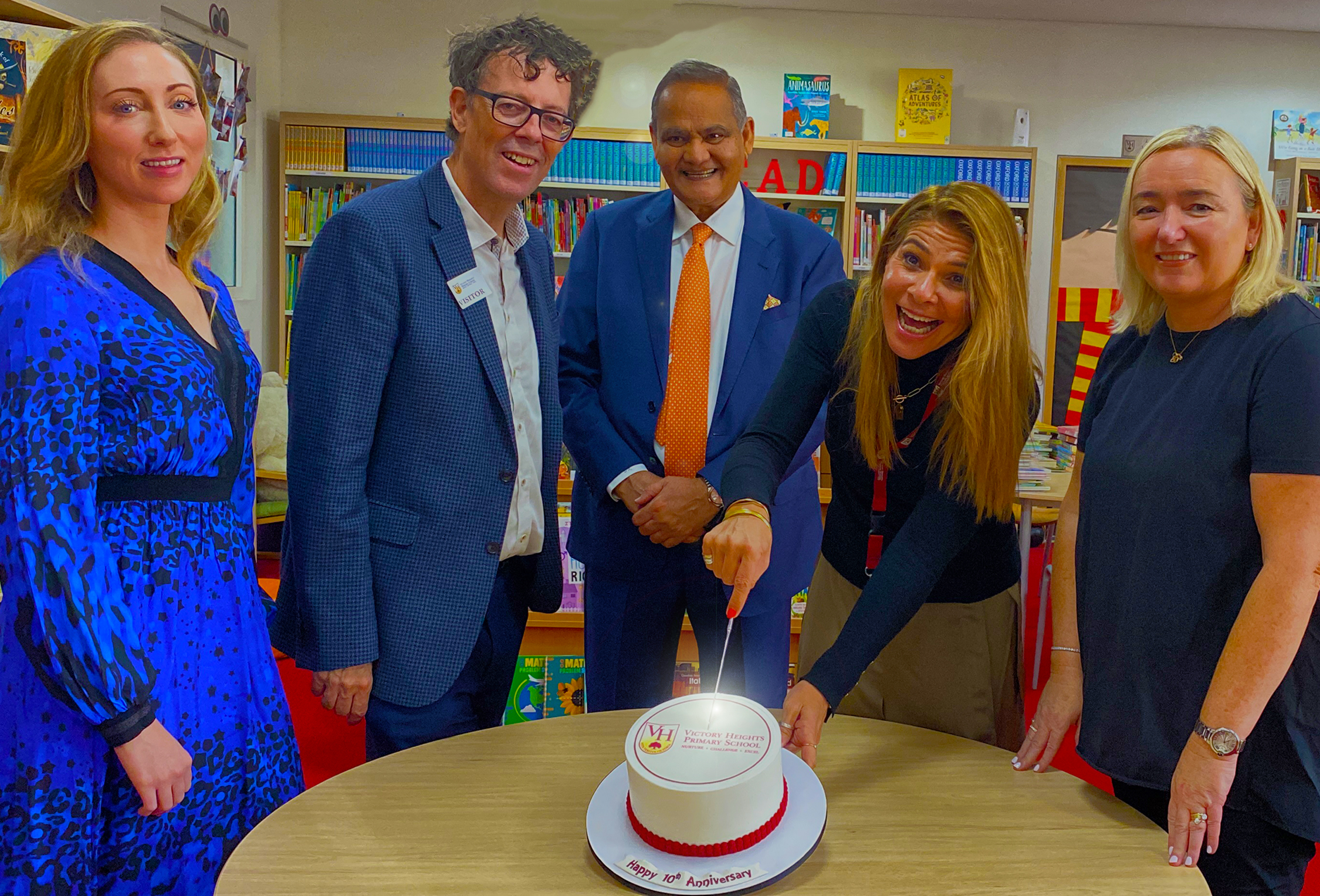
Pictured, left to right, Mrs Tabitha Barda, Senior Editor of SchoolsCompared, Mr James Mullan, Co-founder of Which Media; Mr Dinesh Kothari; Mrs Sasha Crabb, Principal of Victory Heights Primary School in Dubai; and, Eimear McKenna Singh, Head of Business Development for SchoolsCompared and WhichSchoolAdvisor worldwide.
But Mr Kothari surprised us. There is a joie de vivre about him; his eyes sparkled and he laughed as a younger man might, clearly revelling in celebrating the achievements of those who joined him on a day to celebrate the success of Victory Heights.
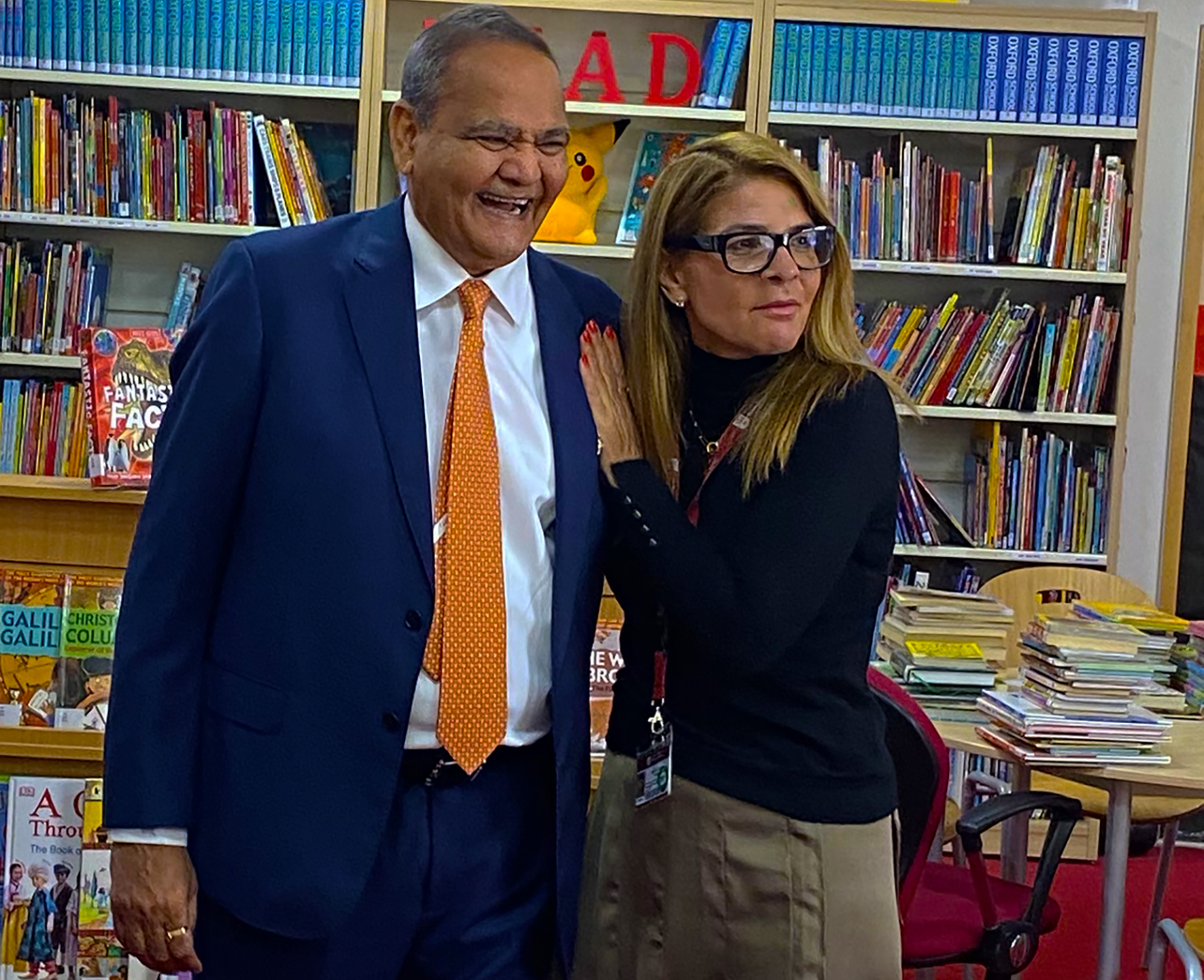
Pictured: Mr Dinesh Kothari (left) and Mrs Sasha Crabb, Principal of Victory Heights Primary School in Dubai (right).
Top on the list of those being celebrated is Mrs Sasha Crabb, the long-standing Founding Head of Victory Heights Primary School, who told us that Mr Kothari’s capacity to inspire and empower her, in equal measure, has kept her tied to the outstanding school they have built together, with no desire to look beyond it. Such loyalty, in any industry, is all too rare. In education it is almost unheard of. Anyone who has met Mrs Crabb will know of her own ability to light up a room so we should perhaps have expected that putting her together with Mr Kothari would result in little less than fireworks.
Tellingly, Mr Kothari was at pains to point out that the celebration cake we revealed would need to be “significantly” larger to ensure a piece could go to all those teachers, students and parents who had, too, played such an important part in achieving the tenth anniversary milestone.
Like Richard Branson, Mr Kothari does not like being defined by his wealth as a billionaire.[1] Too often, individuals who have made a difference in the world are viewed through the reductive lens of their net worth, losing all the richness of their stories; the ethics that have guided them, the hard choices they have made – and the impacts of their achievements, and mistakes, on others.
In fact you would not guess at Mr Kothari’s net worth were it not for his understated yet elegant suit and tie. It is a small thing, but he made us feel special that he had chosen to dress up for the occasion.
In education we look at each child on their own terms – their potential and achievements. We do not box them in by defining them in monetary terms, whether in terms of their personal wealth or that of their parents. As you grow older wealth becomes much less important, its value merely transactional in being able to make a difference before it is all just too late.
We were relieved meeting with him when he showered on us his smiles and welcome. We had worried far too much that we would be more excited at the anniversary cake we had spent weeks discussing with a local baker for him than he would.
We needn’t have vexed.
It turned out that Mr Kothari was human too.
He liked cake as much as we do…

Change the world
Mr Kothari rarely gives interviews. He does not need to.
And we sense a gentleness and humility about him we found touching from a man whose impacts would have seen others clutching a megaphone.
We began our interview asking Mr Kothari a question none of us likes to ponder, but one which is particularly difficult as you grow older with so much less time left to act:
“If you could go back in time and change any of your decisions, would you?” we asked sensitively, tentatively… but also driven by that very human curiosity that hopes for confirmation that we are not alone in having regrets.
He answers swiftly, and it’s clear Mr Kothari has vexed over this question before. We should have expected that perhaps:
“Looking back over my years in education, the lesson I draw is that as the world changes so quickly – the needs of children, and those things which constitute an outstanding education for the 21st century, evolve….”
He clarifies:
“What is needed at one point in time, is rarely ever the same later.”
Mr Kothari pauses briefly, then continues:
“Today, knowing now what I do, I would do two things very differently. Yes, two things.”
“First, I would have bought up much more land for my schools. Today, more than ever I think, schools need to meet the needs of wider society – and that means they need ever more facilities – and outstanding ones. When I began building schools I did so to meet the needs of children and families at that time.”
“But the world is so different today. The needs of students I believe are much greater – and more advanced. The stakes are not higher, but they are different.”
“If I could go back in time, I would invest far more in buying up parcels of land so that I could do more to broaden opportunities for students. Take Sport, as one example. Yes, we can, of course, and do, use external facilities – some outstanding, including those at Dubai Sports City. But… I do really wish we had the land today to provide these facilities in-house and at scale. I believe today that the more outdoor space and facilities you offer students, the more you can give children the chance to find their passion, to spark that thing which will engage them in their lives to achieve for themselves and contribute to the wider world.”
“The story of what is possible in education in the UAE is in many ways a story of the possession of land.”
It is telling in his answer that he finds solutions in tangibles, drawing on the most grounded, basic thing of all; the land. Perhaps he still relies more than he believes he does on his background as a Chartered Accountant. Mr Kothari pauses for thought briefly, then continues:
“Yes….I wish today that I did not face the limitations I do with land. It is not only about Sport of course. If I had more land, I could, and I would, do so much more for children both inside and outside my schools.”
For a single moment we catch a sense of regret before he looks up and smiles, seemingly at a picture he pulls into his mind, perhaps one imagining what could have been:
“Oh! The building I would do… so much; the many extra and inspiring investments I could make in our children and future generation…if I just had… that land.”
“You see,” he continues, “if I knew what I do today, and with that land in place, I would have invested so much more in Labs of every type. I would build, and build, so many more of these Centres of Discovery for students. I would invest not only in the sorts of standard Labs we had then, and have today, but go so, so much further.
“I believe, as we begin 2023, that globally all schools need to invest much more in technical education. As educators, we have not done nearly enough. Giving students opportunities in technical education requires investment in building and innovating in Labs of every description so that students can invent, and be creative, using any number of the technologies of the modern world we now have available.”
Mr Kothari continues:
“I believe passionately that we need more Labs in schools for Engineering, Technology and the Sciences – but we also need them, and perhaps more, for the breadth of the Creative Arts world. We need to give our students the ability to invent, to create in every conceivable way…. We need to give every child a more active role in physically and intellectually building the world around them, and so solving the issues that face us all. It is their future after all…”
We should not have been surprised that Mr Kothari is so passionate about the creative industries or the application of knowledge. It is far too easy to label him through his professional training as an Accountant, when the truth is much more complex. It is well known that Mr Kothari is an evangelist for Poetry and Music, this captured perhaps best in his role as a Trustee of The Ibaadat Foundation, an organisation established to fight against the perceived injustices and dangers of a mechanised world that dilutes these transcendent parts of the human spirit, and its capacity to feel, imagine and invent, to mere frippery when compared to the hard currency of finance, the US$ and Dirham.
He summarises:
“Education today begins with providing our youngest children access to the transformative power of clay and art materials to create an understanding in them of their power to transform the world – and perhaps ends in giving our older students access to industrial machinery to enable their hands-on capacity to construct, and make, and remake, the world on scale. The new world, I believe, requires more than ever that we give our children skills, real skills, and wide-ranging skills, that they can take with them, and apply, as a lifelong toolbox, when they graduate from school.”
Leaving home
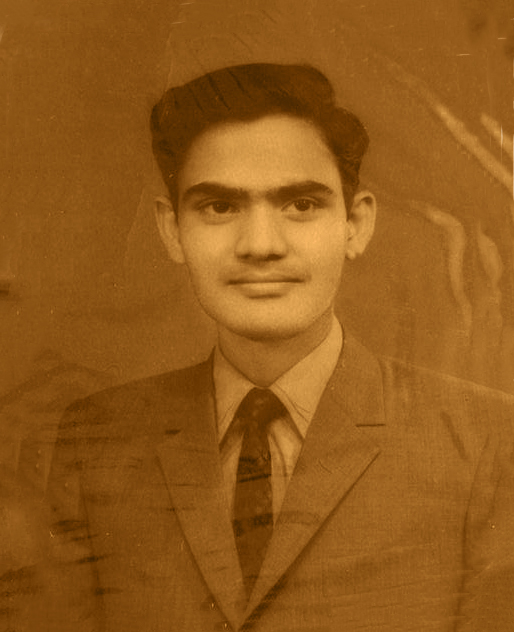
The younger Dinesh Kothari filled with hope in the heyday of his career as banker in India
The journey in life so often tells us much more than the arrival, and we ask Mr Kothari to sketch out his life for us:
“I am 73 years old and, in 1950, was born in The Blue City, Jodhpur, historic capital of the Kingdom of Marwar and today the second city of Rajasthan. That was my beginning….. It is always difficult for any of us to capture a life and who… everything, we are, in just a few words…
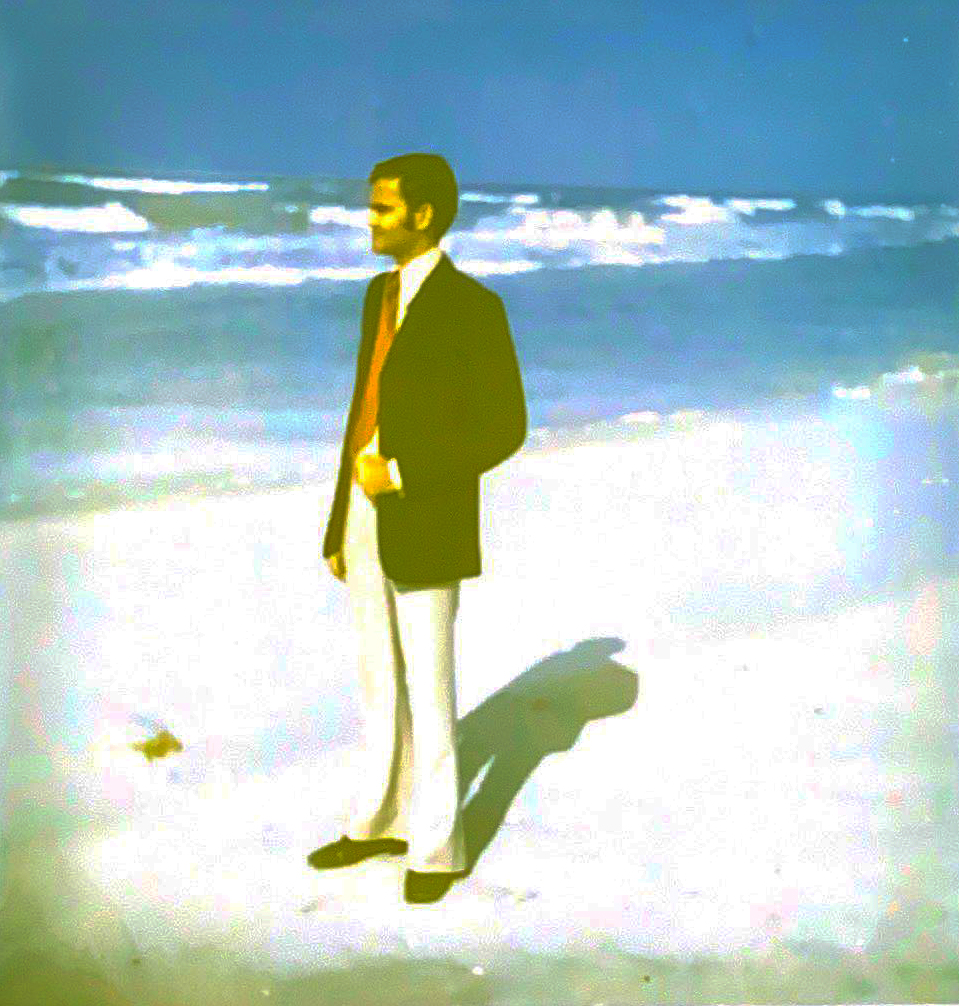
Mr Kothari pauses, clearly calculating where to begin. We get the sense he is grappling with the issue of where to begin a story that runs back and forth between continents and loyalties. It’s certainly a theme we return to over the course of our time with him. He takes the simple way of avoiding the issue:
“But…professionally, I am a chartered accountant.”
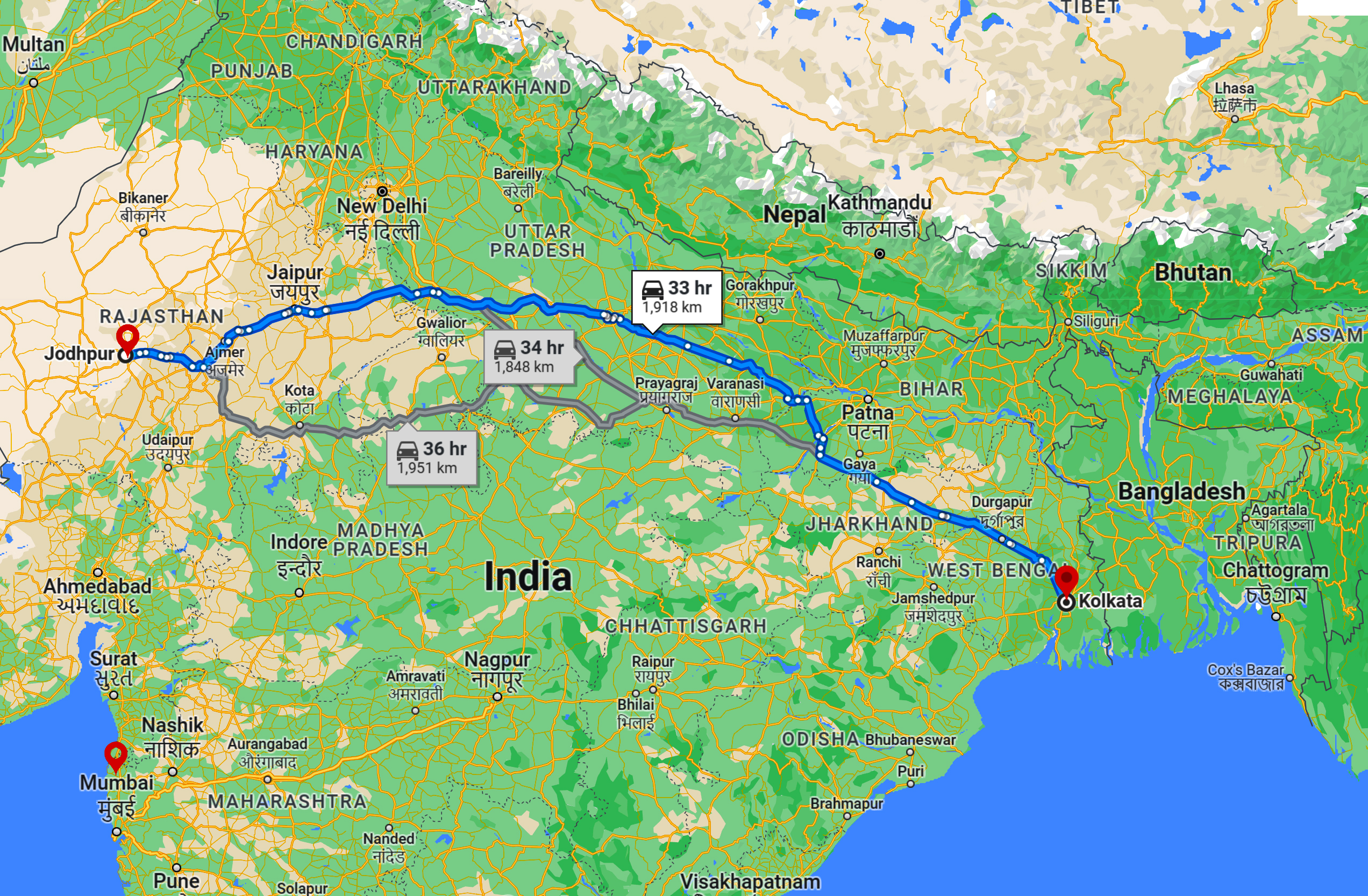
“I studied between Rajasthan, Kolkata and Hyderabad. I gained my Bachelor’s degree in Accountancy from Jodhpur in the late sixties. From there I went to do my CA [Chartered Accountancy].”
“And then it all seemed to move very quickly,” he tells us.
“I started my career in Mumbai, with ICICI. This was a time, remember, when it was a development bank affiliated with the World Bank, not the retail bank it is today. This was a place I saw as one I could have impact – a potential influence on the world. I worked there for a couple of years and then…”
“…there was the most important change in my life.”
“I got married.”
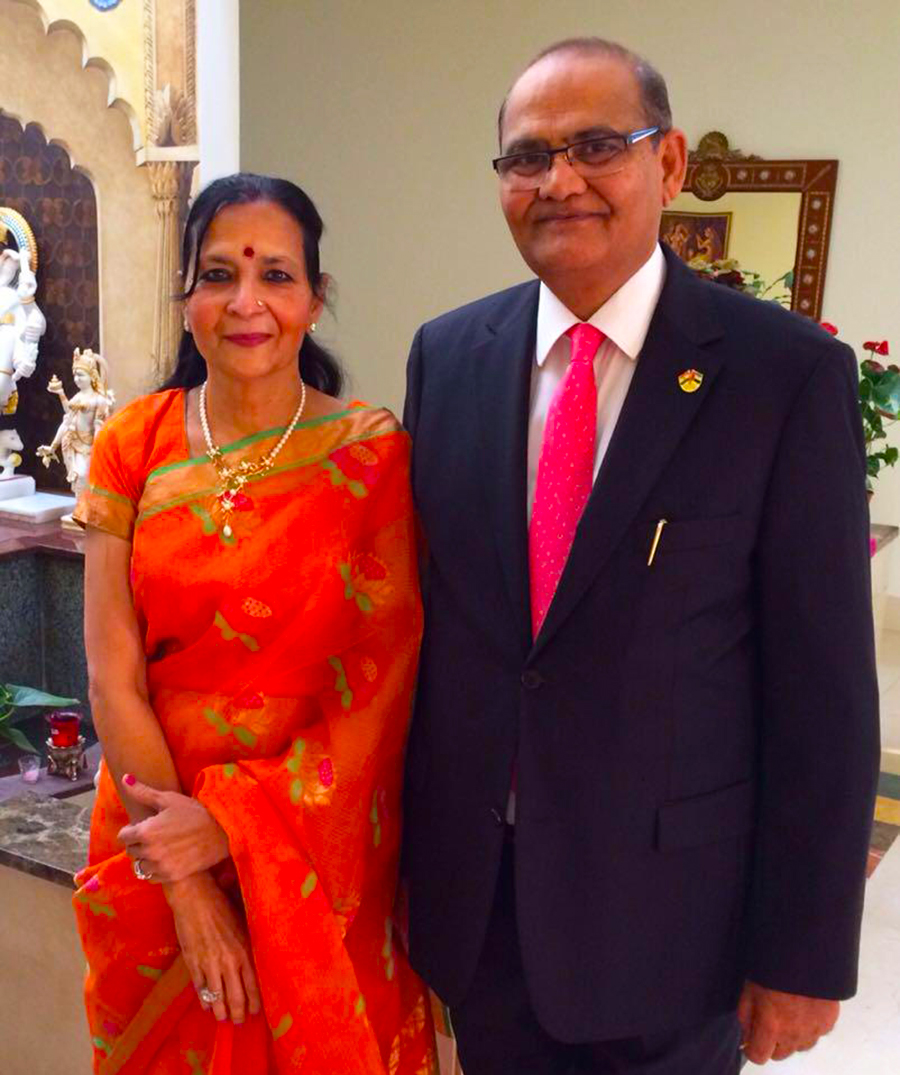
Pictured today: Dinesh Kothari with his wife Neelam Kothari.
Mr Kothari smiles at this point, before frowning:
Soon after this I realised that the money I earned was nowhere near enough to survive in Mumbai and support my family. It was tough.”
“At that time I had a grand salary of just 600 rupees [AED27] a month. I was now married, living in Mumbai – an expensive city even then – and life was really hard.”
“I had all these ambitions working for a bank that could enable me to make a difference in the world – but now I had a family. That had to come first. So I looked for opportunities elsewhere. As exhausting and difficult as it was, I left no stone unturned.”
“And then it occurred to me. I had, in India, an outstanding job, one full of potential and opportunity. But…. I simply was not going to find an alternative in India that would give me the ability to look after my family and make a difference. Really my life was wonderful. But… it was not enough.”
“It’s funny how fate steps in when you need it most. Maybe I have just been lucky…”
“I met somebody who was starting a business in Dubai – and they asked me whether I would join them.”
Mr Kothari pauses again, thinking.
“It wasn’t an easy decision, at all. ”
“You know, I remember, I was very apprehensive. Should I leave such a wonderful job? Should I leave everything I had known and loved behind? Whilst I rationalised that Dubai would be an adventure – I had a family and adventures were not at the top of my list of priorities. Remember, this was 1974: Dubai was far from the extraordinary place it is today. It was certainly not at all seen as a destination for professionals seeking to make their place in the world.”
“I cannot remember how I eventually made the decision. Maybe I just realised that sometimes in life you have to make one, even if it is one head long into the unknown. So in around 1974 I made the jump.”
“‘I’ll come for a couple of months. If I don’t like it I will come back… home,'” I said.
Mr Kothari pauses for a long time.
“…I never did go back.”

1974 – 1987
A new life in the UAE but…
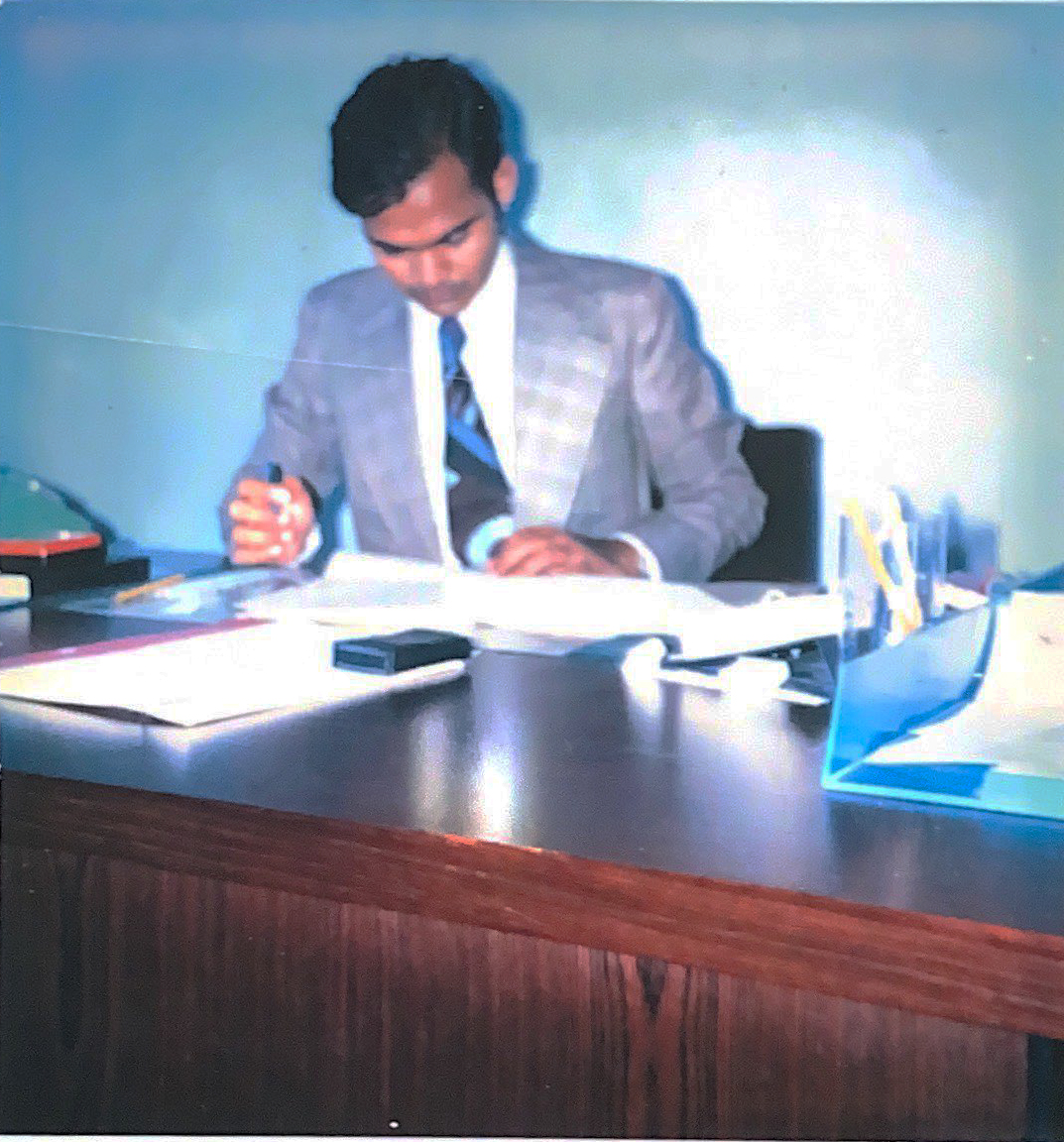
“I started my career with Bukhatir Investment Group in Sharjah. I joined them as a Finance Manager in the construction division for what today is known as Eastern International.”
Mr Kothari pauses in thought, surprised:
“I was still young!
Only 28, 29 years old….. so young…. and I found myself promoted in 1978. I was given the position of Chief Executive Officer. The Group was starting to grow rapidly as it flexed with a Dubai economy firing on all cylinders. In’ 78 we employed shy of 1000 people across five companies.”
[…]
“By 1987 when I left the company, Bukhatir had more than 6000 employees with 35 Group companies and offices spread all around the world.”
Eleven years later, everything changed again for Mr Kothari.
“I am not sure what happened…. but I realised I missed India.”
“I missed Home.”
“I needed to ensure that my children had their roots grounded in India. my home. I think that was a primary driver. I am sure that many parents have grappled with this conundrum. If my children had been educated here, I felt they would have lost something important from their identity, their culture – a part of us, our family history…”
“It weighed heavily…”
Gathering his thoughts, he continued:
“So, really, history repeated itself. Just as I had left India to come to Dubai, leaving behind an outstanding career, so too I now did the same – I left Dubai, with my family, leaving everything behind.”
“But this time… ”
“…we were going…”
“…Home.”
1987 – 1999
The Wonders of India
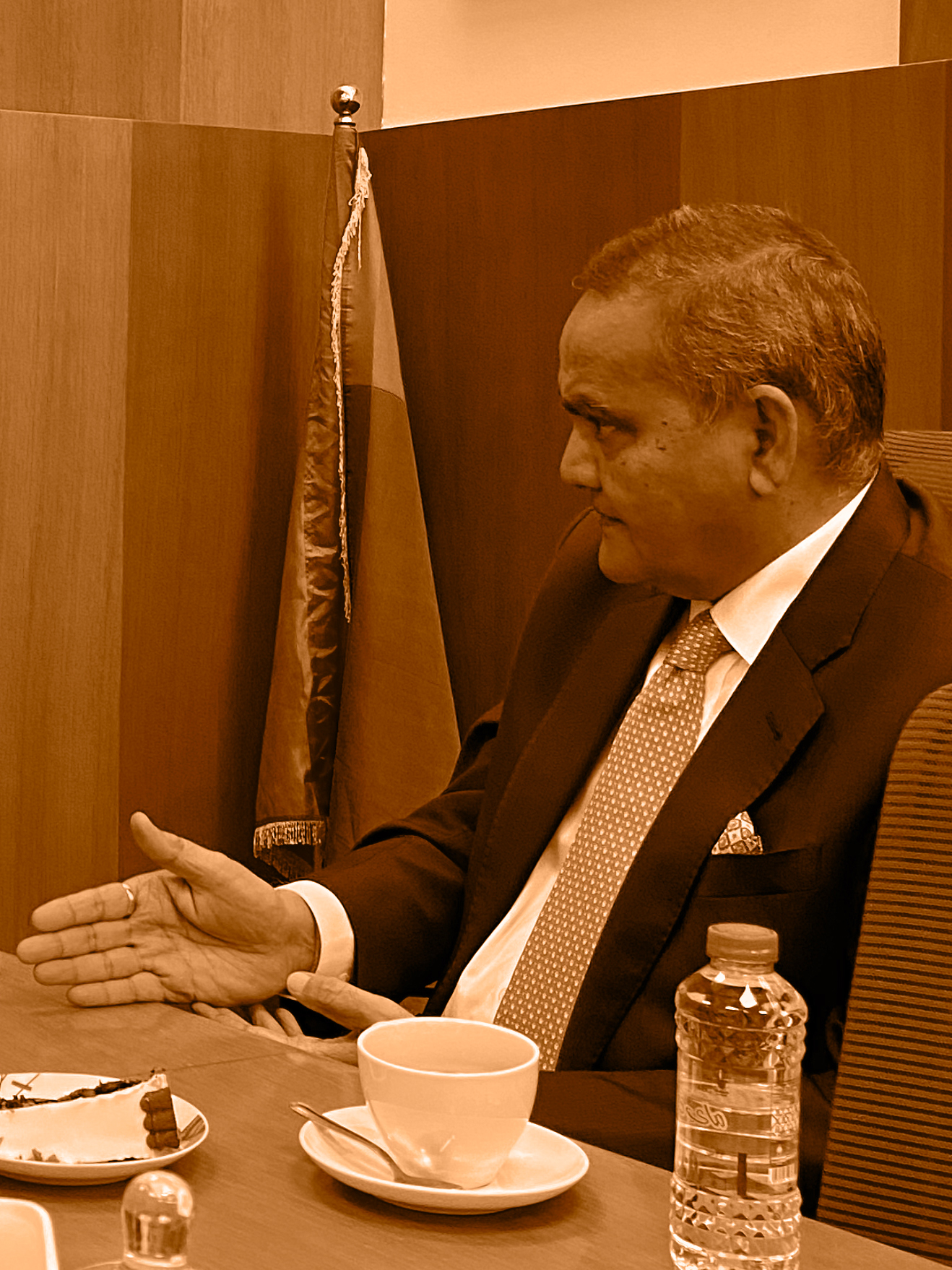
“It was, looking back, the right decision. Perhaps, just in time, my children settled into school in Delhi.”
“If nothing else, this was the right decision for them.”
“When I put it all together, it is my family that has been the foundations upon which I have made many of the decisions in my life that have turned out to be the important ones.”
“Yes, family first.”
“During that time I was not unoccupied. I travelled between continents and across India. I employed my talents where I knew they would be most relevant: corporate advisory services; merchant banking; and, chartered accounting. But I think I knew something was missing. I was home, but there was more to be done. I needed purpose.”
“And then, in 1997, I had a conversation. I won’t say with whom; I would need to ask them first. But it was decisive and their words struck me like a comet. They asked me simply:
“‘Why don’t you do something in Jodhpur? It is your home town?'”
As we listen, Mr Kothari takes a deep breath:
“And he drove the point home…”
“‘You’ve done nothing back home.'”
“Of course, he was right.”
“And as soon as I thought of home, I thought of my late Grandfather; Shri Shugan Chandra Kothari. And I thought of his vocation as a teacher. He came to India from Pakistan after his graduation from Lahore, investing his life in a vocation that would see him arguing tirelessly for the empowerment of women in society, the potential of democratised knowledge to create the changes so needed in my beloved India – and being an educator until the end of his days.”
“I knew then what I must do.”
“I had found purpose.”
“Looking back I acted really fast. We set up our first school, Delhi Public School, in Jodhpur. It was, and remains, proudly a not-for-profit even today.”
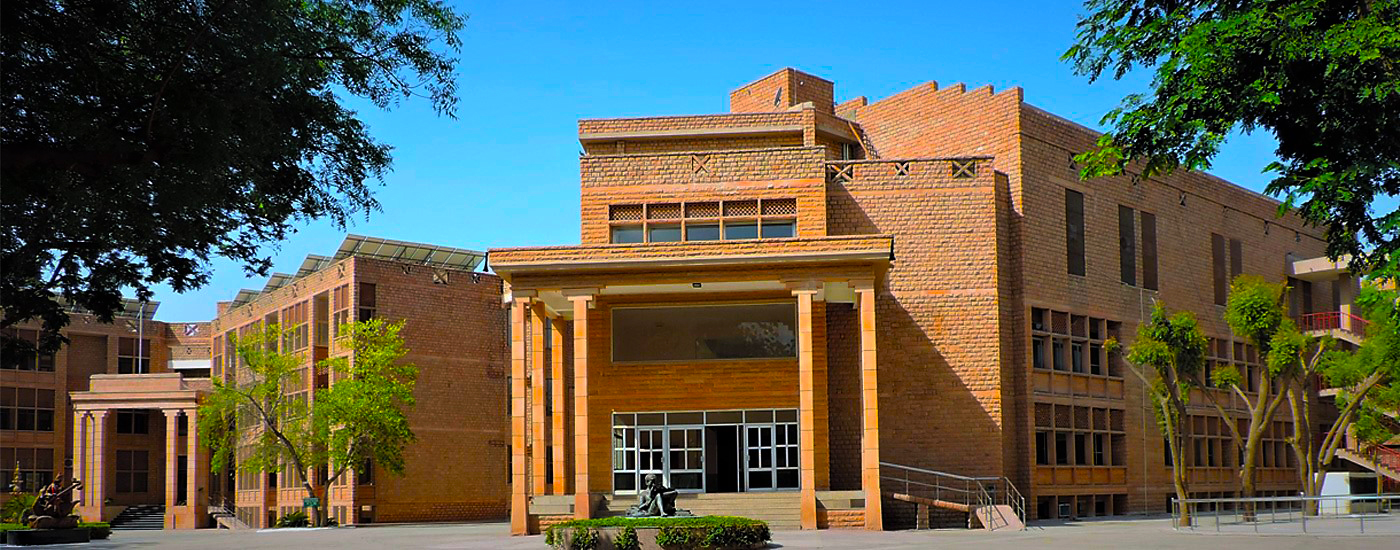
Delhi Public School – Johdpur founded by Dinesh Kothari in 1998.
Mr Kothari stops for breath, gathering his thoughts. And what he says next he says with intensity and passion:
“You see, I built it in the memory of my late Grandfather.”
“I built it in the heart of my home town. I built it in the great nation that is India.”
“It is run through a not-for-profit trust in his name that should outlast me and the generations to follow.”
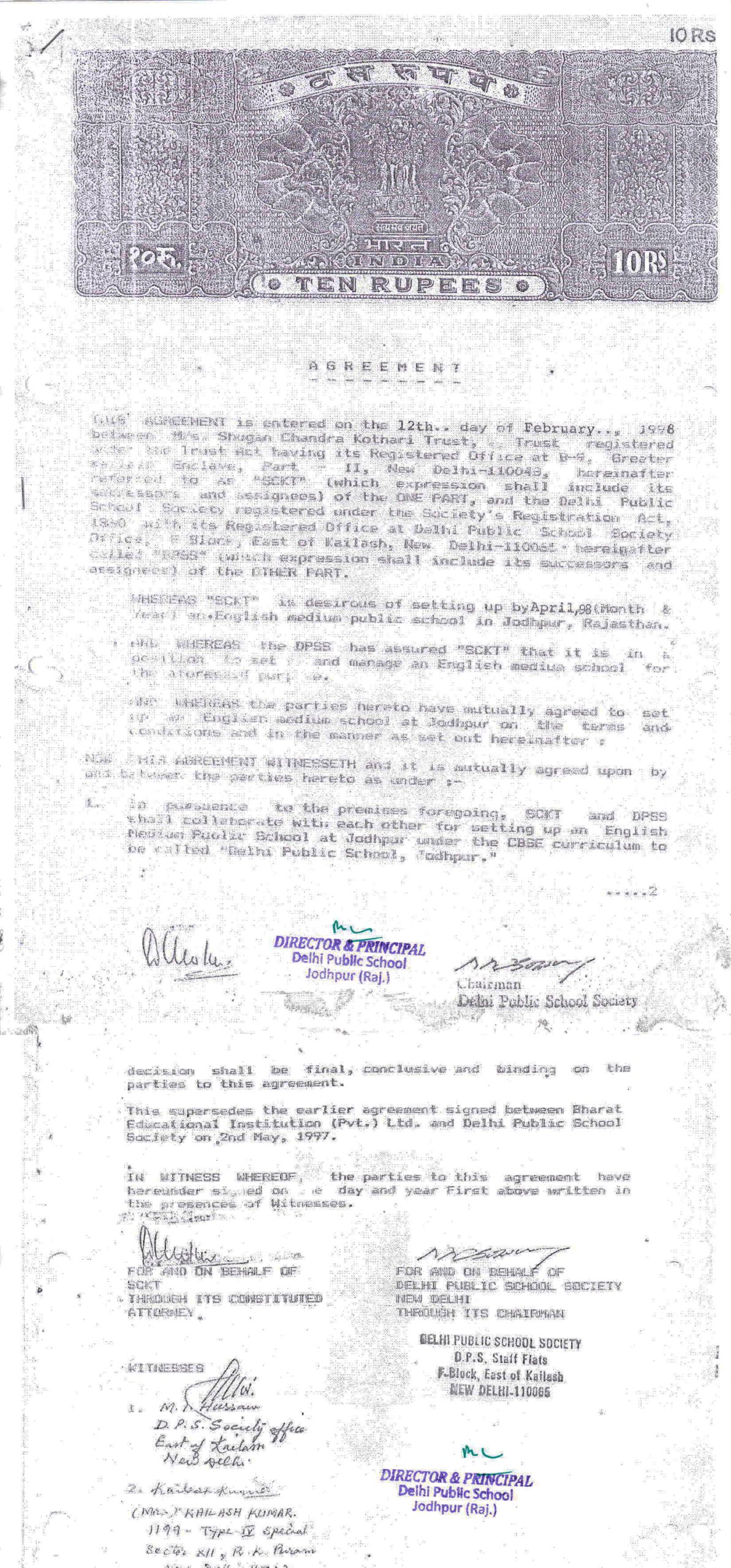
Original license for the opening of the proudly not-for-profit Delhi Public School by Dinesh Kothari in 1998
One of the recurring themes as we interview Mr Kothari is family:
“Neither my grandfather, or father, had a background in business. Quite the opposite – both were public servants, working as part of the government for the greater good. It is this focus on the bigger picture that I inherited from them.”
“They also taught me resilience and commitment. They helped me understand that once you commit to something, you need to go the distance. You just don’t give up. There were many times during my training as a Chartered Accountant when I wanted to do just that – but they had made me understand the importance of persevering; that we all give our best when we are under pressure.”
Mr Kothari continues:
“We modestly started the school from a rented building with just 147 children.”
“Today Delhi Public School – Jodhpur encompasses a 60,000 square metre, 15-acre campus educating 5,000 children. We provide accommodation for staff and students.”
“It is a school that makes a difference.”
“A big one.”

1999 – 2023
The Return to the Emirates and the Building of Schools
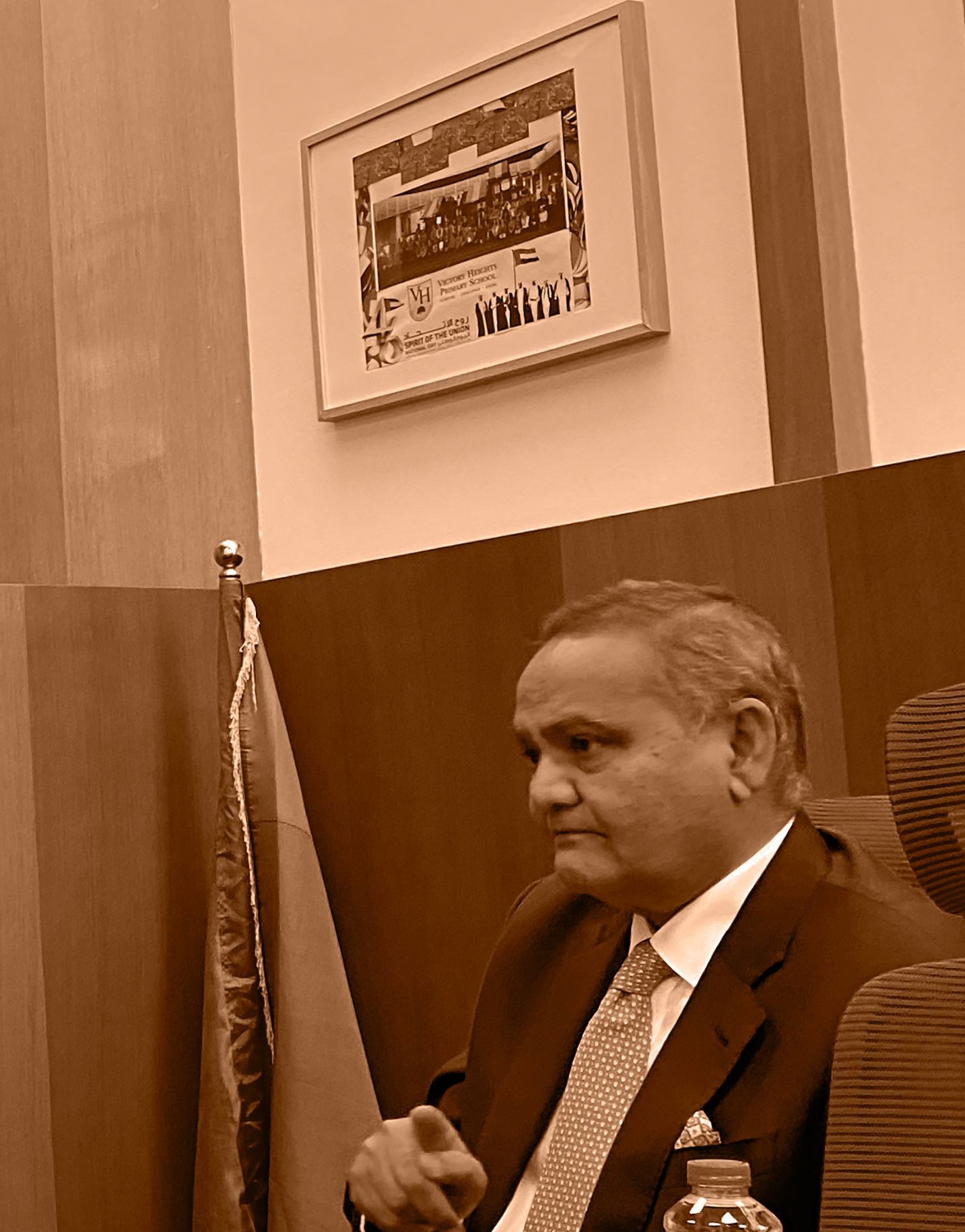
More than a decade after the return to India, the UAE beckoned again:
“In the late 90’s I had an extraordinary school up and running transforming the lives of children. I had also built up my business investments through my new consultancy.
But I was also missing the UAE.
Putting the two together and the idea of launching a school in the UAE evolved to the point of action. In 1999, we began building our first UAE school in Sharjah; Delhi Private School – Sharjah. Of all the emirates, at that time the need was the most in Sharjah. We took the project on with huge resolve and passion, completing the works within two years with the school opening in 2000.”
“The school began with a roster of 240 students – a significant number for a new school, but this was even in its early days a school established to deliver an outstanding Indian education, something demanded by families in the emirate where demand far out paced supply.”
“The rest is history. Today we have 6,000 children – and I believe the most outstanding Indian curriculum school in Sharjah today. The school, year after year, has evolved, annually shining a light on what an outstanding CBSE education looks like if you invest in the right leadership, philosophy, teachers and prioritise the interests and care of students. If you put children at the centre of every aspect of school life meeting their needs and ambitions – and build powerful links with the community and families that you serve, everything falls into place.”
“So yes, from around 2000, I finally combined the two drivers of my life – the commitment to the bigger picture, through education, which my family had inspired within me, and the business skills I had learned from my formative years in banking and the consultancy business I had established when I returned to India.”
“Dubai Private School Sharjah was established from Day One as a for-profit school with a proper economic structure designed so that, as the needs of children evolved, so too the investment was in place to make sure we delivered to those needs swiftly and powerfully.”
“After the success of DPS Sharjah, we received an invitation from the Government of Dubai to open a school in Dubai Gardens, a community modelled on the famous English Garden Cities and the first to be built in the UAE. Here was a developed community built, in part, to serve the expansion of Jebel Ali and the key technology hubs of Dubai Media City and Dubai Internet City. What was missing was an outstanding hub school for the community to drive its growth – and we shared the view with the Dubai Government that parents and students as the community developed would need to have access to a world class education.”
“The project took time – not least because, as a Garden City, the community was some distance from central Dubai. It also needed on our part, and the government’s, to have faith that this was a community that would thrive. When we started this project there was nobody living in the Gardens. Whilst Media City and Internet City were established, those working there were opting for more developed communities in the suburbs of central Dubai rather than Jebel Ali.”
“Yes, this was an act of faith on our part – and my belief in the ambition and vision of the Dubai Government.”
“Again…. the rest is history. Opened in 2003, the school worked! Our second school in the UAE, Delhi Private School – Dubai, attracted people to The Gardens relatively quickly and helped grow the Gardens and Jebel Ali Village to the prosperous and engaging communities they are today.”
“Of a total school roster today of 4,000 children, over 2,000 are drawn from with The Gardens.”
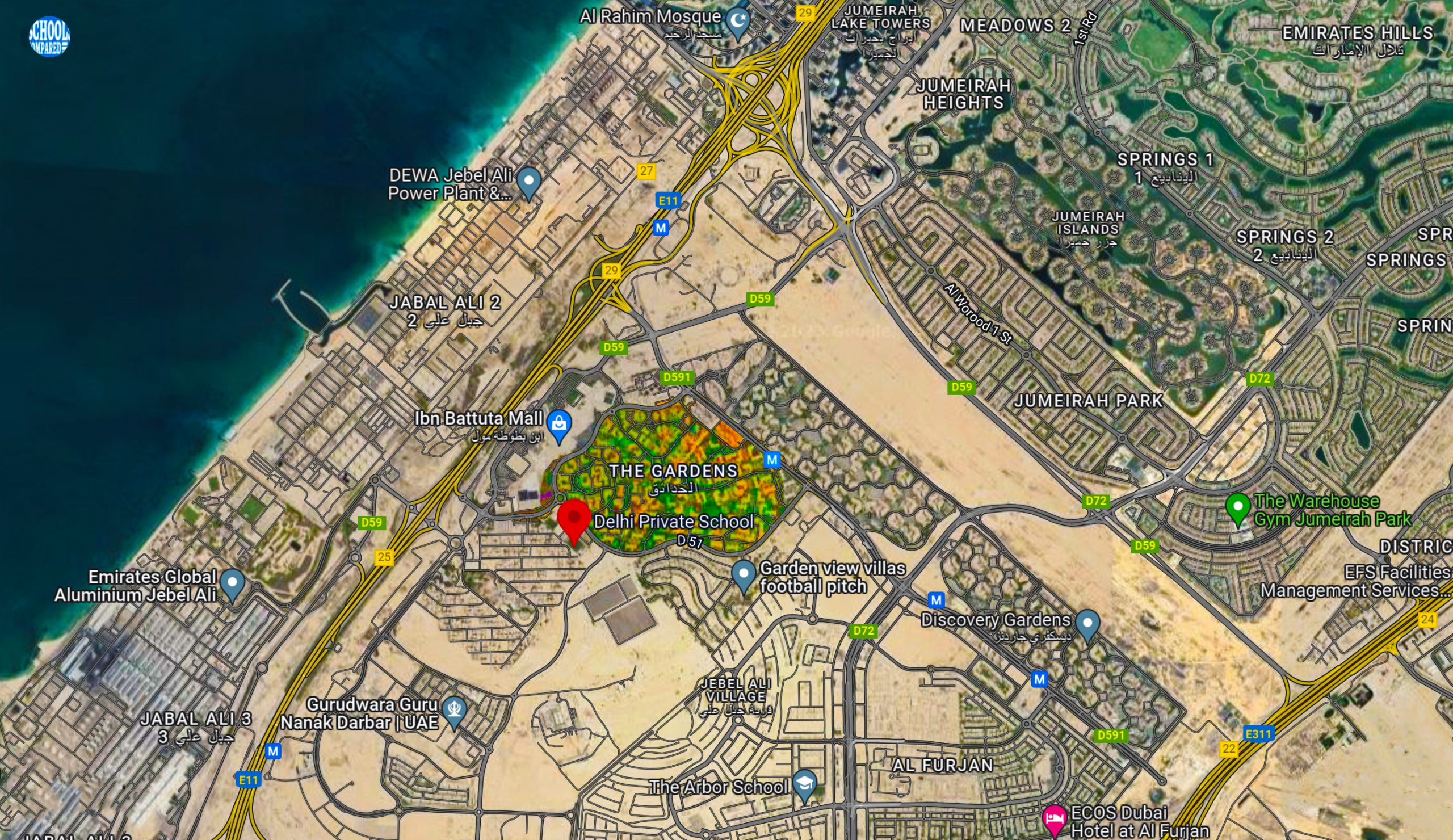
DPS Dubai – the hub school for The Gardens Community in Dubai, one modelled on the ideals of the English Garden City – and the first in the UAE
Mr Kothari continued:
“…and so DPS Dubai became a genuine community school – a real community school in the fullest most honest definition of the word. I am so proud of everything that the leaders, teachers, parents, and children, together, have created at this beautiful high achieving school.”
We asked Mr Kothari whether, with DPS Sharjah and DPS Dubai now established, whether this was the end of the DPS story for him.
“Yes, you are right; we have achieved what we set out to do. But that is not the end of the story. As His Highness Sheikh Mohammed bin Rashid Al Maktoum has said, “In the race for excellence, there is no finish line.”
We asked Mr Kothari whether his work was done.
“Have I finished? No. We need to do more. Obviously, space again remains a limitation in our current DPS schools because they’re full campuses.
“But… we can build more.”
“So we are looking at the possibilities of creating new DPS campuses. And we’ll invest in those differently, with more emphasis on Sport and the labs needed to drive technical education. There will be a much greater focus, as we move forward, on technical and specialist skills needed by children in today’s industries and those coming, rapidly, down the track.”
With three landmark schools sharing their DPS identity established proudly across India, and the emirates of Sharjah and Dubai, the next school, one we were here to celebrate with Mr Kothari, was arguably his bravest – and certainly one which presented a bigger leap of faith than even The Gardens. We asked him to explain the story of how Victory Heights Primary School, and more recently, Victory Heights Foundation, his first British curriculum schools, came to fruition.
” So the story of Victory Heights Primary School is a complex one. The idea evolved – the plan was never to open a British School at all.”
“My old and dear friend Abdul Rahman Bukhatir was a partner in the development of Dubai Sports City and speaking one day together he asked if would support his new project with a school. We came back, of course, to the fundamental issue with establishing schools – the need for land. I asked him to help me with the land needed for a school that would have an impact and this is how we came to buy the site on which Victory Heights Primary School is situated today.”
“Originally I had envisaged an Indian curriculum school. This is, after all, what I understood and knew. It was where my passion in education was born and then flourished.”
“But I swiftly realised that this location was not at all the right one for an Indian curriculum school. What parents, students and the broader Sports City community needed was a British school.”
“And so started a very big journey for me. My family played an integral role, offering their perspective and understanding of the British culture and education gained from their education in the UK.”
“So we took a chance…”
“As we started to build, with not even the foundation of the structure completed, we met Sasha who was visiting Dubai from Cairo. She made a huge impact on us both and joined us swiftly afterwards.” Sasha has played such a key role in the development of Victory Heights – and has done such a remarkable job in building this school to the outstanding one that it is today.”
“Looking back, ten years ago when we opened, Dubai Sports City was so different. This was a huge business risk for us – to build any school was a risk, but opening a British school needed a deep breath and courage. Sasha’s role and leadership in giving parents the confidence to join the school cannot be overstated.”
” and the result? We became a community school here every bit as profoundly impactful as that in The Gardens – and, like our school DPS Dubai, became the hub school for families in this community.”
We asked Mr Kothari what makes him most proud of Victory Heights Primary School:
“The team across Victory heights Primary School, at every level of the school. Unlike so many schools, they have chosen to stay with us for a long time. They are valued by me – and are, in short, absolutely fabulous. But equally important are our parents. They have made us their first-choice school. That matters so much to me. Our parents are our best ambassadors. They speak with others about us in the community – and that in turn builds our community. So this is what makes me proud – the confluence of all these things together in a tremendous focus on the future of our youngest children.”
“It is people – Victory Heights Primary School teachers, leadership, children and parents that matter, not the buildings.”
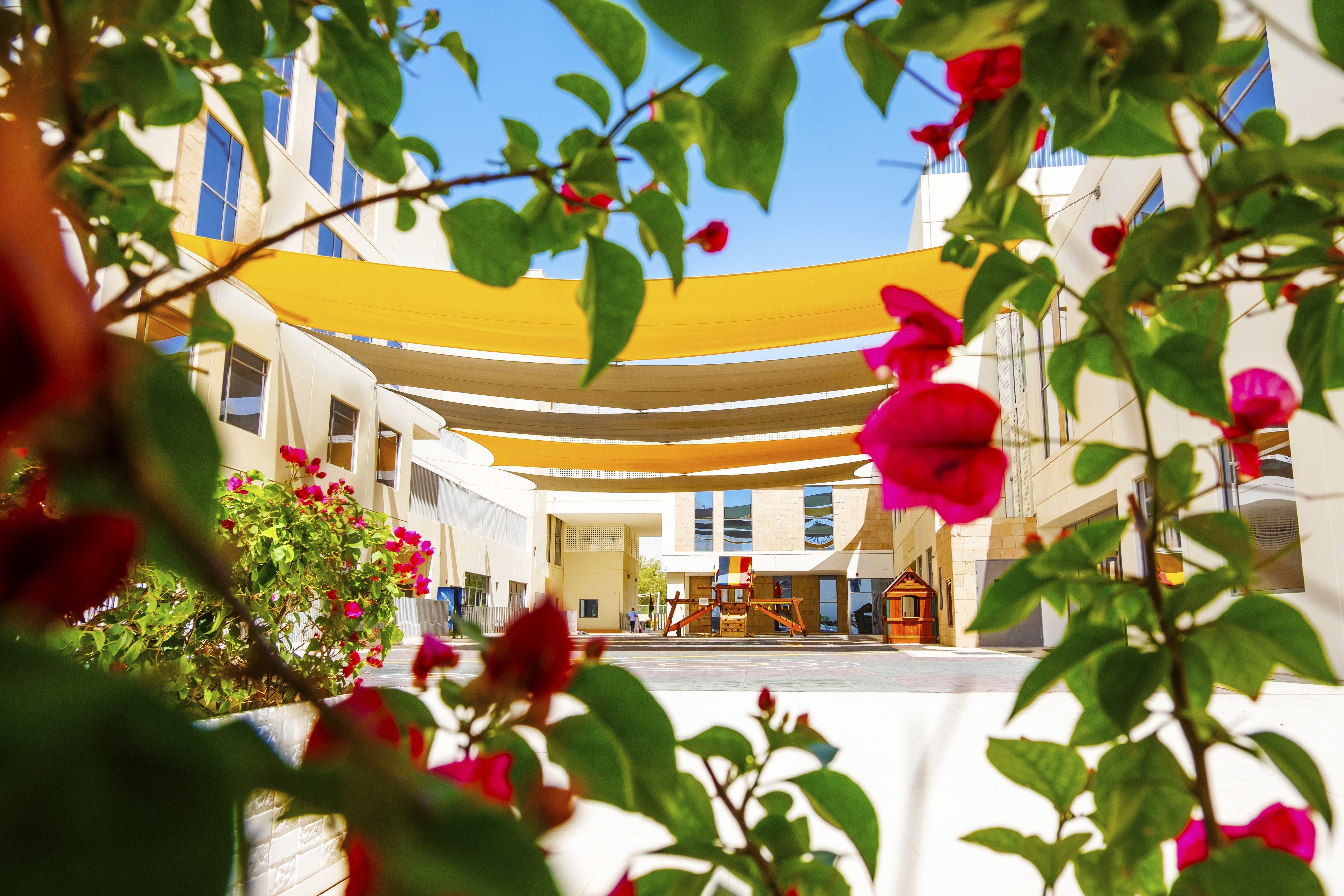
“Our latest British School, South View School Dubai, opened in 2018, was the natural extension of Victory Heights. It was the Secondary School we had always planned for Victory Heights Primary School- but the age-old problem of land surfaced again. We simply could not obtain land of the scale we needed on this site so South View School was opened in the heart of the Remraam Community some 10 minutes journey from Victory Heights.”
We asked Mr Kothari, again, what made him most proud, this time of his latest British school.
“What matters, what is so special, is again that in such a short span of time we have become the preferred choice of our parents. And it is the scale of their investment in the school and belief in what we are seeking to achieve. My projections for this school at this time were for 950 students to have joined South View School. Today we have 1200 students. It matters because it gives us all the confidence that we are doing things right – we are achieving, and that too outstandingly, for their children.”
“Amit has played a very important role in the success of South View School Dubai, working with David Flint, South View School’s outstanding Principal. David has led outstanding schools schools across both Asia and the UAE and this is reflected in the quality of teaching and learning at South View which today at least matches that of any of the top schools in Dubai.”
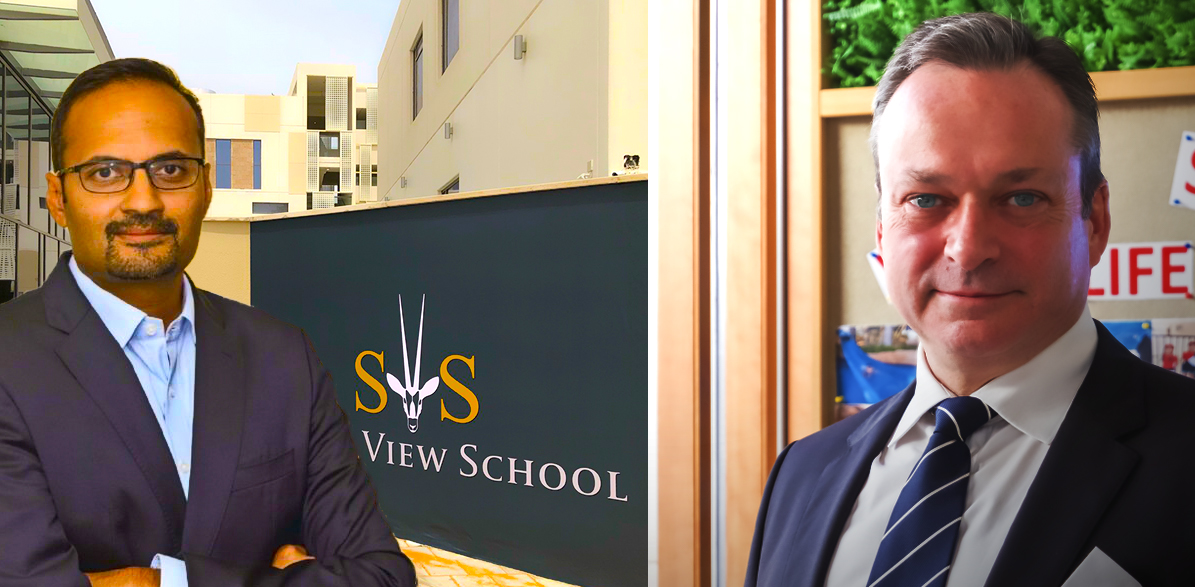
Pictured, left to right, Ami Kothari, Executive Director of Interstar Education, outside South View School Dubai / David Flint, Principal, South View School Dubai.
So, “do you believe that British education is the best in the world?”, we asked him.
“No. At the end of the day what matters is what children do with their lives when they graduate from any school, whatever its curriculum. At our DPS schools, the Indian curriculum also opens up countless opportunities for our students to study at Ivy League universities in the US and Russell Group universities in the UK.”
“However, the truth is this. The Indian education system today was originally invented to a large degree in England. The foundations of modern Indian education reflect this contribution of Great Britain. Even our CBSE curriculum is very heavily influenced by the British system.”
“So it would not be fair for me to say that British education is better than an Indian education. What I can say is that a British education is a preferred one in the world, and particularly for children who want to continue their studies at Western European universities.”
“And the British system too is very application oriented with both a technical stream in BTEC and an academic stream in gold standard A Levels. And that makes it special.”
“So too is the British curriculum emphasis on academics. On balance I would say that no other curriculum is as difficult, academic – or demanding, as that based on a British education.”
“I say this too as someone who serves on the board of an organisation that has played a key role in IB education in India. I am not as excited by IB education as I am in British education to educate children.”
We asked Mr Kothari whether he would ever consider building an IB school.
“I will not say that I won’t consider building one. Our journey in life is unknown – and opportunities may come. But, where we are today, for me this focus on the twin pillars and strengths of British and Indian curriculum schools is the right one.”
“And I will say this. The CBSE board, rightly, does not permit CBSE schools to blend with other curricular or offer the IB curriculum in the way that the CISCE does. I have seen it done when schools try and get around this, for example, by creating a small isolated block on their grounds to teach the IB – and even then I have only seen it done for the IB Diploma and not the IB career-related Programme. But that’s not the proper way of doing it. These schools do no justice to either the CBSE or IB.”
“These schools have turned themselves into supermarkets.”
Mr Kothari takes a breath….
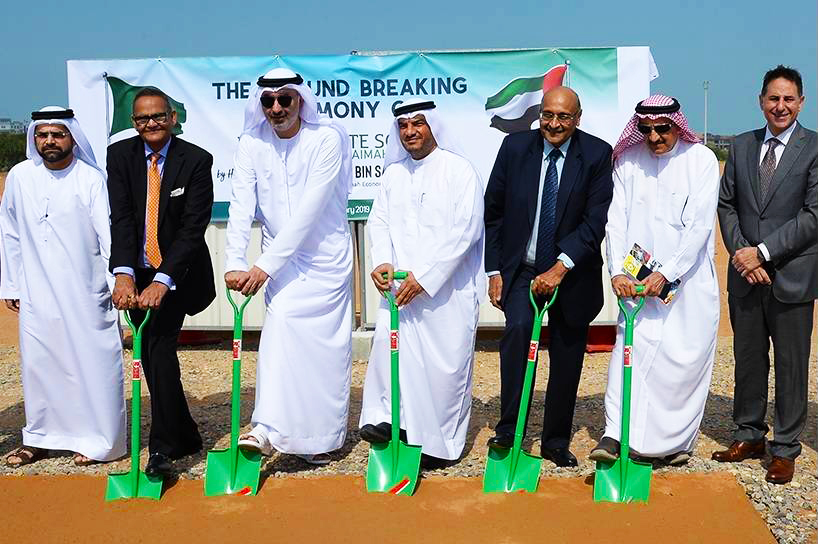
Pictured left to right: Khalid Mohammad Abdalla Al Khayyal Al Ali, Dinesh Kothari, His Highness Shaikh Ahmed Bin Saqr Al Qasimi, Ali Mohammad Abdalla Ahmad Al Khayyal Al Ali, Pravin Batavia, Ebrahim Al Sahi, Ramy Jallad.
“Then, in April 2021 we opened Delhi Private School, Ras-Al-Khaimah, this following the launch of primary-only New Delhi Private School Sharjah in 2017.”
“And that is where we are today.”

The Future
“So what next?” we asked Mr Kothari. Is this the end of the journey, we wondered. Perhaps we should not have been surprised when he rejected any idea that he was slowing down. Quite the contrary.
“Where do I see us 10 years from now? We need to build more schools – and create more facilities for students in those we have. Our work is only just beginning.”
“Even today when I leave here, I go to look for land nearby to create more facilities for secondary students…”
We asked Mr Kothari whether, of all his achievements, whether his schools are the most important.
“There is nothing, absolutely nothing, more important today.”
“I cannot think of doing anything else now except focus on education. I must do this for our children; for our future generation.”
“We will be launching more schools. Yes, this is the focus of my life.”
“The reason is quite simple. Education is the bedrock and foundation upon which the future of a child is built. It is the greatest gift we can give to our children and securing their future.”
“But it is more than this.”
“Every child can make a difference in the world. It doesn’t make a difference which child it is – because God never created two people alike. We all think differently. We all have a different skill set. Yes. All of us, and every child, has the capacity, and ability, to make a change in the world, and have an impact on the future, every single day of their lives.”
“There is one promise I ask of all children when they are about to graduate from my schools. During your lifetime, if you do nothing else, however you achieve it, please educate one child.”
2023 -2027
Home
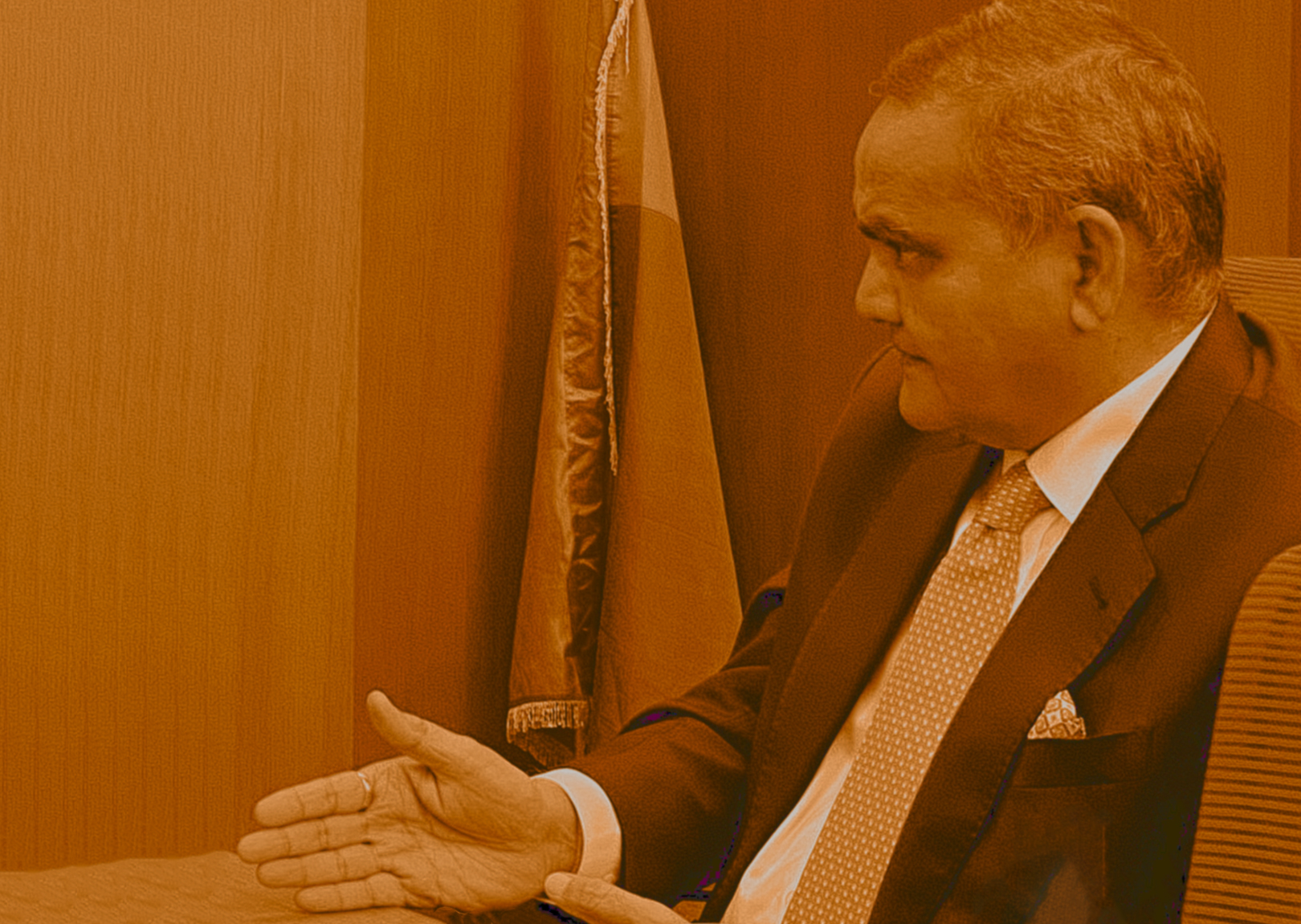
We asked Mr Kothari, on the tenth anniversary of his opening Victory Heights Primary School, what drives him when so many of his peers have long since retired to a life spent on the golf course.
“What drives me today is the desire to give back. In many ways my story, up until the point I returned to India to build my first school, was very circumstantial and related to my life and career. Education is different. Education is about building a legacy.”
“Our schools will have an impact on the world, on India and the Emirates, long after I and those who knew me have gone.”
“They are like books, something that last forever, and impact all that have experienced them, whether, as is the case with books, as readers, or, as with schools, the children who have been educated in them.”
“So that’s why I continue today.”
Then Mr Kothari smiles:
“I enjoy it. I have the same passion for it as I had when I opened my first school.”
If there is one thing of which no one could be in doubt, listening to Mr Kothari, it is exactly that this unwavering passion for education which drives him – with his deep-rooted ambition to make a difference in the lives of children.
“There is so much still to do,” Mr Kothari tells us.
“The world needs doctors, lawyers, accountants. It always needs these professions. But today it also needs thinkers, inventors and creatives too, and more than ever. Today we need all our professions to be both. It is from the combination of specialising and being creative that the engines of our new world take life and a new world filled with innovation and impact emerges.”
“And books and knowledge are just not enough. Today’s world requires management skills, and that means our children need also to develop the wide-ranging soft skills this demands. They need to be emotionally engaged and emotionally intelligent. You cannot build an organisation without these.”
“This is exactly what makes outstanding schools. You can have all the bells and whistles, all the shiny glass windows and facilities in the world – but it’s not the bricks and mortar that matters in a school. What matters is the spirit of a school. People build the world, change the world. Bricks and mortar do nothing in themselves.”
We asked Mr Kothari how schools can begin to bring these two skill sets together better.
“We need to empower our children much more. The same holds true of young men and women when they leave our schools. We need to give children and young people ownership of those parts of the world they are working on. I was empowered very early on in my career. Without those who had such faith in me, my story would have been very different.”
“Second, values are so important. Knowledge changes. Values do not. They are a constant in our lives. They become as much a part of us as our DNA. Schools have such an important role to play here. Those who believe that schools are about only exams and knowledge, fundamentally misunderstand them. Schools play a vital role in building these value frameworks that guide us all as we progress through life. From respecting the religions of others, their countries and the colour of their skin, to respecting and appreciating the people around you and all that flows from this – these are the soft skills that bring life to the world and really power the engines of productivity, evolution and the building of a better world.”
As he leaves we ask Mt Kothari for a secret… Is there to be a new school? We wonder whether he will reveal something…. He surprises us yet again.
“We are almost on the verge of finalising a piece of land. I have a meeting with the lawyers today to finalise the agreement. We are 99% there but we need to cross the last t’s and dot the last i’s so we can pass it on to the landlord and say this is what we want. We can close it, inshallah, in the next two weeks. If this happens our next school will open within the next three years. It will be a British school in Dubailand. After this we will open another Indian curriculum school. Again we are at the point of having made an offer on the land.”
As our time with Mr Kothari drew to a close, we ask him what “home” means to him today. We ask him whether he sees the UAE, and Dubai, as his home, drawing as it does a meeting point for East and West, a bridge to his beloved India and the wider world.
“I need to tell you a story.
“It was somewhere between1975 and 1976….”
Dubai was not like it is today. I was driving on a road that was little more than rubble and sink holes. At that time there were few proper roads.”
“My car broke down, stuck in the rubble.”
“And my wife and little son were with me.”
“A local Emirati gentleman stopped his car. I remember he was driving a beautiful and very grand Mercedes Benz. He helped pull my car out from the rubble. He actually lifted my car from the ground.”
“I forget so many things, but will never forget this moment. This touched my heart deeply and, in so many ways, defined how I feel about Dubai, the UAE and Emirati people.”
“On that day a kind Emirati gentleman helped me, my wife and son continue our journey.”
“That gentleman became a proxy for the wonderful people of the UAE.
I have experienced the same kindness and values for almost fifty years. ”
Today I proudly call Dubai, and the UAE, my home.”
And then again he brings us back to family.
“I have only one son, Amit Kothari, and one daughter, Priyanka. My daughter is married and settled in New York. My son is my partner in education. He chose this. He shares my values. He is completely responsible for South View School.”
“Schools are not businesses for the short term.”
“Schools are legacies.”
“These are investments in the future generation of children – and the world.”
“His home, as mine, is here in the UAE.”
“We carry today a very deep responsibility. Schools are not businesses in the traditional sense. Education is, and has to be, a passion. There is too much at stake for it not to be. The important stakeholders are children – and the families that entrust us with them.”
“We have made a commitment to them, and the UAE, which must be honoured.”
©SchoolsCompared.com. A WhichMedia Group publication. 2023. All rights reserved.
Notes
[1] Richard Branson, speaking with Tom Swarbrick for LBC in December 2022, said: “I hate the word billionaire… I see myself as somebody who loves to create things… I’ve never thought of going into these businesses with the idea of making lots of money. What I’ve tried to do is create things that people like, and that enhance the Virgin brand and reputation, and that at the end of the year more money comes in that goes out. Calling somebody by their wealth is slightly demeaning. I am an entrepreneur.”




















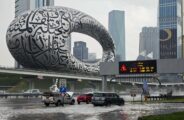






















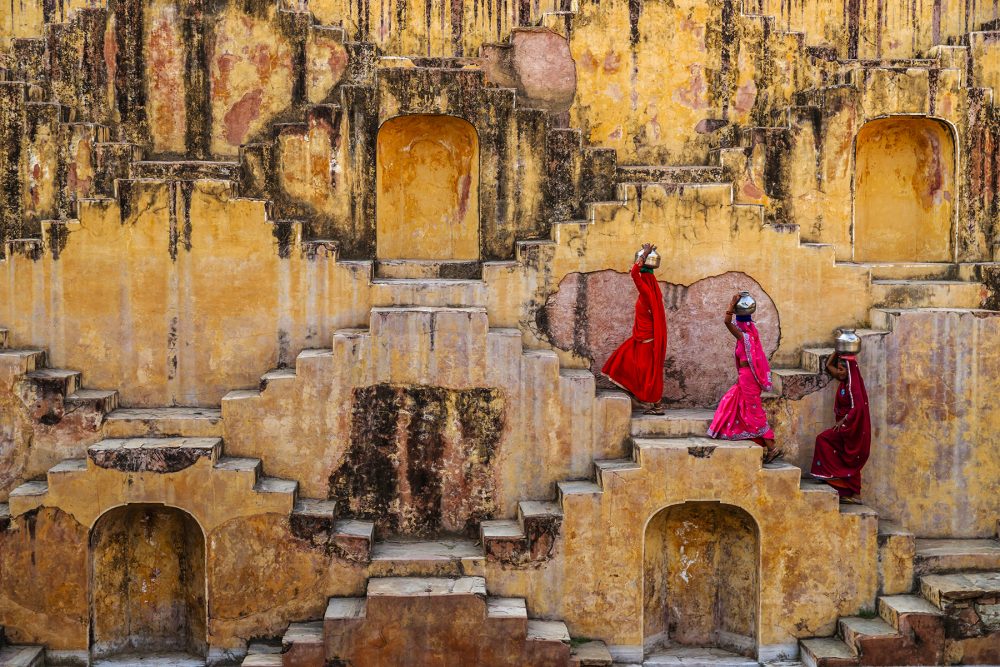

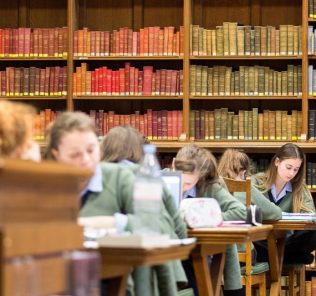














Leave a Response